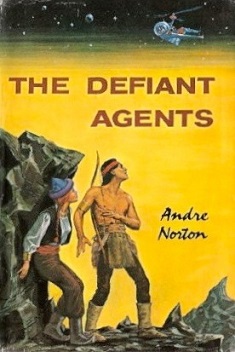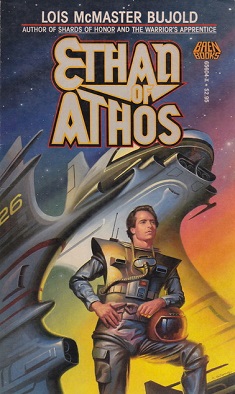
The Defiant Agents
Andre Norton
222 pages
published in 1962
The danger with relying on Project Gutenberg for your reading is that you end up missing things, like in this case, where the first novel in a series, The Time Traders was available, but the sequel wasn’t and I only noticed once I had started to read this, the third in the series. Luckily the first chapter is all setup and infodumping, explaining how in Galactic Derelict time travel led to the discovery of a fully functioning alien spaceship, from the same aliens as see in the first novel and that in turn led to a warehouse full of navigation tapes. Those tapes were divided by lot ver various countries, including Soviet Russia and of course with the Cold War raging between the West and the USSR, spying is rife. As The Defiant Agents opens, one Soviet plant has manages to get his hands on the navigation tape for one of the most promising planets the west has in its possession, which means a crash expedition has to be launched to colonise it before the Russians do.
That crash expedition becomes literal when it turns out the Soviets are already there and have hunter/killer satellites in orbit, shooting down the expedition’s spaceship. Thanks to a bit of luck and a bit of skill the ship, though damaged, still manages to crash land on Topaz in such a way that their enemies think they’re dead. With the crew dead, the colonists, now less than forty, all volunteers from an Apache tribe, have to build a new home on a world with not just hostile nature to contend with, but also hostile humans as the Soviets who have poached the planet are still there. And it’s up to Travis Fox, once Time Travel Agent, to guide his people.
The reason why Apaches were chosen as colonists is because they, like the other groups of volunteers, had “a high survival rating in the past” and they were suited to the climate of Topaz; the other groups mentioned being “Eskimos from Point Barren” (sic) and Islanders. As with so much Golden Age science fiction, you never quite get the feeling the planet much more than stage dressing, certainly not an idea that planets are huge and don’t really have a uniform climate as such.
As Fox explores Topaz and the Apaches get settled, he runs into the Soviet colonists, which turns out to be Mongols who unlike the Apaches are held prisoner through the use of mind control machines. Like the Apaches, those Mongols had been subjected to Redax training, which leads them to live the lives of their ancestors while crossing space from Earth to Topaz, leaving most confused about which life is real, that of the Russia they barely remember or that of the Golden Horde. In either case, their will to escape the Soviet mindcontrol is great and it’s one such escapee, Kaydessa, that Fox runs into as she tries to flee into the mountains that would shield her from the mind control rays. Through a series of adventures Fox’s Apaches and Kaydessa’s Mongols of the Golden Horde team and overthrow the Soviet dictators and set out to lead a new and free life on an alien planet.
So yeah, there’s no denying that The Defiant Agents, like the whole Time Traders series is a product of its time, of the fifties-early sixties Cold War period. The Russian baddies are pure evil with no redeeming features and there’s that consistent paranoia about their technical abilities, far beyond those of the American heroes, who have to counter with pluck and moxie. Not surprising as this was written in the shadow of Sputnik, when the Soviet mastery of the space race seemed to prove the superiority of their system. Reading from a post-Cold War point of view this seems naive, but of course we know a lot more about the realities of Soviet Russia than could’ve been known to Norton at the time.
Far more importantly is that this is a novel where, save for the talking heads in chapter one, all the major characters are people of colour, either native Americans or Mongols, with only the Russian baddies being white and those mainly exists as obstacles. Even now this is rare in science fiction, let alone in 1962. Robert Heinlein has gotten a lot of credit over the years by making Rico out of Starship Troopers Philipino as well as hinting that Rod out of Tunnel in the Sky is black, but he never wrote a novel as upfront about having characters of colour as this one.
Mind you, the portrayal of the Apaches and Mongols both, while clearly intended to be respectful, is probably somewhat on the cliched side. I’m not too familiar with Apache culture but it reminded me here of the better sort of western movie.
One recurring Norton theme, that of the bond between telepathic animal and human, is also present here, with Fox having a telepathic bond with a pair of coyotes specially bred for this. Interestingly, Norton explains their powers by making them the descendants of coyotes living in White Sands, which is of course where the US had its first atomic tests…


